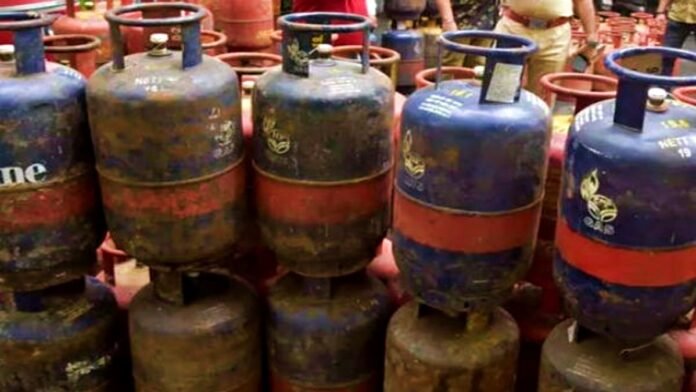
Key Points
- Commercial LPG cylinder (19 kg) prices increased by Rs 15.50-16 across India effective October 1, 2025
- Delhi rates rise to Rs 1,595.50, Mumbai to Rs 1,547, Kolkata to Rs 1,700.50, and Chennai to Rs 1,754.50
- Domestic LPG cylinders (14.2 kg) remain unchanged at Rs 853 in Delhi since April 8, 2025
- Aviation turbine fuel (ATF) hiked by Rs 3,052.50 per kilolitre
- New LPG portability rules proposed by PNGRB to allow inter-company switching similar to mobile number portability
- Price hike primarily impacts restaurants, hotels, and commercial establishments during festive season
New Delhi: Oil marketing companies have implemented a fresh price revision for commercial LPG cylinders starting October 1, 2025, marking yet another increase amid the ongoing festive season. The 19-kilogram commercial LPG cylinder now costs Rs 1,595.50 in Delhi, reflecting a Rs 15.50 hike from the previous price of Rs 1,580. This adjustment comes as part of the regular monthly price review conducted by state-run oil marketing companies based on global crude oil prices and foreign exchange fluctuations.
In Kolkata, commercial users will now pay Rs 1,700.50 per cylinder, up from Rs 1,684 in September an increase of approximately Rs 16. Mumbai, India’s financial capital, has seen the commercial cylinder price rise to Rs 1,547 from Rs 1,531, representing a Rs 15.50 increase. Chennai recorded a similar hike, with prices climbing to Rs 1,754.50 from Rs 1,738, also a Rs 16 increase.
Impact on Commercial Sector During Festive Period
The price hike arrives at a particularly challenging time for the hospitality and food service industries, as October marks the beginning of the festive season in India with celebrations including Navratri, Dussehra, and Diwali. Restaurants, hotels, catering services, and other commercial establishments that depend heavily on LPG for daily operations will face increased operational costs.
Industry experts suggest that businesses may eventually pass on these additional expenses to consumers through adjusted menu prices or service charges. The hike is likely to directly affect commercial users who require multiple cylinders monthly for their business operations.
Domestic Cylinder Prices Remain Stable
In a significant relief for household consumers, the prices of 14.2 kg domestic LPG cylinders remain unchanged across India. According to Indian Oil Corporation data, a domestic cylinder continues to be available for Rs 853 in Delhi, Rs 852.50 in Mumbai, Rs 879 in Kolkata, and Rs 868.50 in Chennai. These rates have remained stable since April 8, 2025, when the last domestic cylinder price revision occurred.
In other cities, domestic cylinders are priced at Rs 890.50 in Lucknow and Bageshwar, Rs 951 in Patna, Rs 985.50 in Kargil, and Rs 969 in Pulwama. Despite public expectations for a price reduction during the festive season, oil marketing companies have maintained the status quo for household consumers.
Aviation Fuel Costs Soar
Alongside the LPG revision, aviation turbine fuel (ATF) prices have witnessed a sharp increase of Rs 3,052.50 per kilolitre. The new ATF rate in Delhi stands at Rs 93,766.02 per kilolitre, compared to Rs 90,713.52 previously. Other metropolitan cities have seen similar adjustments: Kolkata at Rs 96,816.58, Mumbai at Rs 87,714.39, and Chennai at Rs 97,302.14 per kilolitre.
Revolutionary LPG Portability System on the Horizon
In a development that could transform the cooking gas sector, the Petroleum and Natural Gas Regulatory Board (PNGRB) has proposed draft rules for LPG portability, allowing consumers to switch gas suppliers without changing their connection similar to mobile number portability. The regulator issued these draft rules in September 2025 and invited public comments before implementing a phased rollout.
Currently, portability only permits transfers between distributors of the same company, such as within Indian Oil’s Indane network or Bharat Petroleum’s Bharat Gas. The new framework would extend flexibility across companies, enabling customers to refill cylinders from the nearest available distributor regardless of brand.
Addressing Consumer Choice and Service Quality
PNGRB’s proposal aims to address widespread concerns over service quality, delayed deliveries, and local shortages. The board stated that the objective is to empower consumers and ensure reliable access to an essential fuel, particularly in areas where a single distributor faces operational issues. Industry analysts believe this portability could improve competition in India’s cooking gas market, which serves approximately 310 million domestic LPG connections.
However, implementing inter-company portability presents significant challenges. LPG cylinders are legally considered the property of the issuing company, and current regulations prohibit cross-refilling between companies. Legal amendments, digital subsidy tracking systems, and restructured inventory coordination will be necessary before full implementation.
Historical Context and Implementation Timeline
India previously piloted an LPG portability scheme in October 2013 across 24 districts in 13 states, which was extended to 480 districts by January 2014. However, that initiative only allowed consumers to change dealers within the same company, not switch between different gas companies.
The PNGRB has opened its draft framework for public feedback until mid-October 2025. After reviewing submissions, the board will finalize rules and coordinate with oil marketing companies for rollout. Officials indicate that a phased introduction is likely, beginning in regions with multiple suppliers, with nationwide adoption expected to take several months.
















































